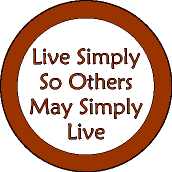"Fear of aging, fear of lonliness, fear of poverty, fear of failure.
Fear is the most basic emotion we have. Fear is primal. Fear sells."
- Max Brooks
Nothing can motivate people to buy crap like an appeal to fear. Marketing preys on our basic human fears, like fear of social isolation, while constantly creating new ones, like fear of non-white teeth or "skin tags".
When we sense fear the brain transmits signals to our nervous system causing our breathing to quicken, and heart race to increase. We become sweaty and go on autopilot, running on instinct. Hardly the best conditions in which to make decisions about spending money.
People with things to sell, hire other people with ideas to sell, who write ads that instill fear in the viewer, whether actual or fabricated. Then they offer you their product or service which (for a fee) promises to dispel that fear.
Most of the time they just want you to be afraid of not having what they have to sell.
The Evolution Of Marketing
Stage 1. Sell a product. For example, a hammer.
Stage 2. Don't sell a product, sell an entire experience. Remember the smell of wood in your grandfather's shop as you pounded nails into boards with his trusty hammer? Our Grandfather Line of hammers are a gateway to a world of possibility.
Stage 3. Don't sell an entire experience, sell fear. When civilization collapses you are going to need our hammer to build things.
Stage 4. When using fear, pile it on. Never mind building everything you need after the global transportation infrastructure totally breaks down, what about the zombie apocalypse? Our hammer neatly dispatches zombies. Better buy several.
We are currently in marketing Stage 4, and mainstream media everywhere are piling on the fear. Not so good for stress levels and bank balances, but great for business.
Fear works best as a way to get people to spend money when the fear is specific and widely recognized. Some common fears that marketers use against us are:
Fear of Loss - encompasses other fears, such as loss of life, youth, health, love, social standing, approval, and so forth.
Fear of Failure - closely related to fear of criticism and fear of rejection.
Fear can be a potent tool. We are more motivated to avoid pain and discomfort than we are to obtain pleasure.
But fear is only an effective way to get us to spend until we stop buying it. That is not to say there aren't legitimate things to fear.
Our biggest fear should be of corporate entities that are active in spreading their poisons in order to profit handsomely from the exploitation of the environment, the work force, and citizens everywhere.
Our fight against them should be fear-less.

























.jpg)
